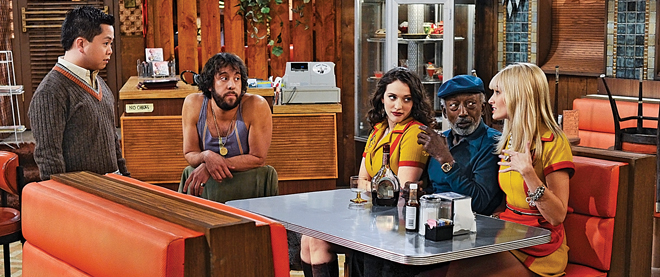Three stereotypes walk into a diner…
Are walking ethnic clichés better than no clichés in sitcoms?
CBS
Share

Michael Patrick King, the creator of 2 Broke Girls, thinks he’s helped the cause of diversity by creating an Asian-American character who says things like, “You can’t tell an Asian he made a mistake, he’ll go out back and throw himself on a sword.” The comedy, the biggest new hit of the TV season, has been pilloried for stereotypical, under-written minor characters. Most pilloried of all, beating out the lecherous Ukrainian cook and the elderly, jazz-loving black cashier, is Han (Matthew Moy), a Korean with an exaggerated accent. The Hollywood Reporter called it a “sorry minstrel show,” and Marissa Lee, who writes for the site Racebending, calls Han “an unimaginative, lazy and flat stereotype.” King responded to hostile critics by pointing out that “the big story about race on our show is that so many are represented.” But Lee says people who wanted to see more minorities on TV are being “asked to pick between two disappointing options: ‘Would you rather be depicted poorly, or not depicted at all?’ ”
Several recent comedies have brought ethnic stereotyping back to TV to an extent not seen since the ’80s. Journalist Amanda Dobbins wrote an article comparing Modern Family’s Sofia Vergara to Charo, the ’70s actress known only for “sexy outfits and Spanish-tinged catchphrases,” and Vergara herself told journalist Maria Elena Fernandez, “We are yellers, we’re pretty, we’re sexy, and we’re scandalous. I am not scared of the stereotypes.” Rob Schneider’s new sitcom Rob, where he marries into a Mexican family, consists of broad jokes about Mexican culture. Even in political commercials, any stereotype goes in the name of comedy. An ad for Senate candidate Peter Hoekstra featured an Asian woman speaking broken English and boasting that her country is taking American jobs; the campaign defended it by claiming it was supposed to be “satirical.”
Some argue this is a step up from the ’90s and ’00s, when minorities were often invisible on TV. King, who produced and wrote the very white Sex and the City, boasted that his new show is “multiethnic, including the regulars and the guest stars.” And Rob has gotten good ratings by being one of the few English-language shows to cater to a growing Hispanic audience; the jokes may upset critics, but viewers prefer it to shows that don’t acknowledge these groups.
But others say it’s not enough to be grateful for any diversity, even if the characters are offensive. “We shouldn’t have to choose between racist stereotypes or invisibility,” Lee says. She adds that it’s possible for a show to make these characters funny without making them offensive, pointing to the Harold & Kumar movies, which play on “the fact that stereotypes are simplistic and shallow. I don’t think 2 Broke Girls is self-aware enough to realize its stereotypes are simplistic and shallow.”
Other shows have proven that broad ethnic characters can work if the audience finds them funny. Vergara’s character has deflected most criticism by becoming one of the most popular on the show. On the Canadian teen sitcom Mr. Young, one of the supporting characters is a Vietnamese janitor known as “Dang from Danang,” but publicist Julia Frittaion said there has been “no controversy at all” over the character, and that the actor, Raugi Yu, is so popular that “he’ll often come in to sign autographs even on show nights when he’s not working.”
The problem with 2 Broke Girls may be that the ethnic characters aren’t popular enough to overcome any objections; Han, along with the other male characters on the show, has almost nothing to do except be the butt of the stars’ jokes. “When communities of colour complain about stereotypical characters like Han, we’re often told, ‘Can’t you take a joke?’ ” Lee says, but she thinks the real question for King is, “Why can’t you tell any good ones?”
King has a plan to improve the comedy surrounding Han: after the critics confronted him, he explained in recent episodes “we haven’t made an Asian joke, we’ve only made short jokes.” When a character isn’t working, it seems a show will always make the most obvious cracks–whether they’re about ethnicity or height.